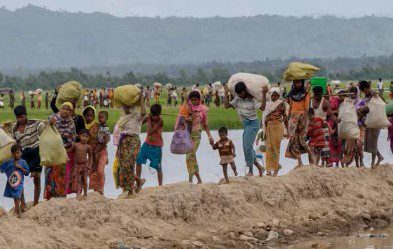Chief adviser’s Press Secretary Shafiqul Alam on Thursday said the interim government is actively engaging with international stakeholders to address the Rohingya crisis.
He added that the government, led by Chief Adviser Professor Muhammad Yunus, is bringing the issue back to global forums as a major topic of discussion and working towards a roadmap for their safe and dignified return to Myanmar.
As part of these efforts, a three-day international conference will be held in Cox’s Bazar beginning on August 24, the press secretary noted.
Briefing reporters at the Foreign Service Academy in the capital, Alam said the chief adviser will attend the conference on August 25, while the dialogue will continue until August 26.
CA’s Deputy Press Secretary Abul Kalam Azad Majumder and Senior Assistant Press Secretary Foyez Ahmmad were present.
Alam stated that two more international conferences are scheduled to be held later this year in New York and Doha. The largest will take place in the last week of September in New York.
Rohingya representatives, delegates from 40 countries, diplomats based in Dhaka and representatives from UN agencies will participate in the Cox’s Bazar conference, he mentioned.
The press secretary noted a special discussion with Rohingya representatives will take place on August 24.
The three-day conference will highlight issues of repatriation, funding and a comprehensive roadmap for the safe return of Rohingyas.
Around 170 countries are expected to join the high-level conference on the situation of Rohingya Muslims and other minorities in Myanmar which will be organised on September 30 in New York on the sidelines of UNGA.
Foreign Adviser Md Touhid Hossain has recently said the government is working on three fronts – uninterrupted flow of foreign funding, keeping the issue alive amid other global crises and ensuring their safe and dignified return.
“The issue should not be forgotten. We continuously bring it to focus. We are working on three fronts,” he told reporters at the Ministry of Foreign Affairs.
Bangladesh sought intensified humanitarian contributions for Rohingyas, stressing that the pressure on Bangladesh’s economy, environment and local communities is unsustainable, the adviser added.
“We are facing mounting humanitarian, developmental and security-related challenges,” Adviser Touhid said recently while speaking at the OIC Ad Hoc Ministerial Committee on Accountability for Human Rights Violations against the Rohingyas.
Bangladesh has shown ‘extraordinary compassion and responsibility’ by sheltering over 1.3 million forcibly displaced Rohingyas despite experiencing a snowballing of the crises.
The United States and other foreign donor cutbacks in humanitarian aid have worsened the already existing education crisis for 437,000 school-age children in Rohingya refugee camps in Bangladesh, Human Rights Watch surveyed recently.
On June 3, 2025, the United Nations International Children’s Emergency Fund (UNICEF) suspended thousands of “learning centers” run by non-governmental organisations in the refugee camps, for lack of funding.
The only education currently in the Bangladesh refugee camps is at schools established by the Rohingya community without outside support or official recognition.
UNHCR, the UN Refugee Agency, and humanitarian partners are mobilising to respond to the needs of up to 150,000 Rohingya refugees who have arrived in Cox’s Bazar in Bangladesh over the last 18 months.
Targeted violence and persecution in Rakhine State and the ongoing conflict in Myanmar have continued to force thousands of Rohingya to seek protection in Bangladesh.
This movement of Rohingya refugees into Bangladesh, spread over months, is the largest from Myanmar since 2017, when around 750,000 people fled the deadly violence in their native Rakhine State.
Among the new arrivals, nearly 121,000 had been biometrically identified by the end of June, with more believed to be residing informally in the already overcrowded refugee camps.
The overwhelming majority are women and children.
More humanitarian support is urgently required as the new arrivals are largely dependent on the solidarity of those living in the camps, overstretching severely diminished resources.


